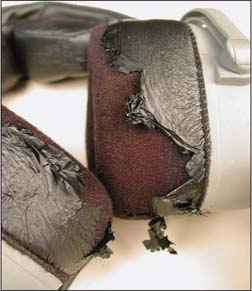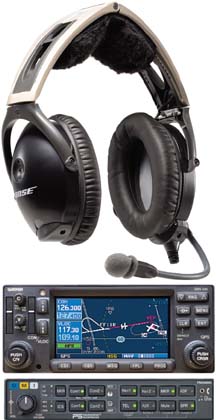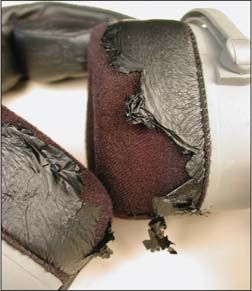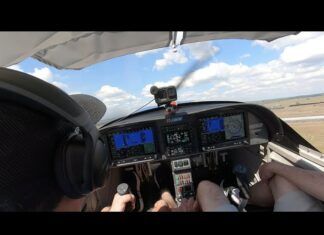
by Paul Bertorelli
Not to sound too cynical, but there are moments when weve had it up to here with the heady romance and magic of flight. We experienced one of those recently when, during the course of a 2000-mile business trip in our Mooney, all three noise-canceling headsets failed. We limped back home barking irritated radio replies into a hand mic and trying to listen to a scratchy speaker.
Getting the headsets repaired-two LightSPEEDs and a Telex-sent us through the aviation industrys highly variable direct service repair system and prompted us to survey how companies actually determine what their repair rates and policies will be. The good news is that, in our view, most companies do it right, offering timely returns at fair prices. A few companies give themselves a competitive advantage by offering cheap or even free repairs while others are less adept at soothing the customer.
In general, the industry has adopted flat repair rates for everything from fuel pumps to avionics. A flat repair invoice is a terrific value if your GPS needs a new circuit board or power supply but is less attractive if all youve got is a loose wire or a chipped bezel. You pay the same, either way.In our estimation, the perceived value of a flat repair has to do with how much it costs compared to how much you paid for the gadget in the first place. When the repair reaches 40 percent or more of retail or replacement cost, we begin to taste the bitter bile of buyers remorse.
Three Headsets
The Saturday after our trip, we boxed up the three dead headsets and sent them off Priority Mail to the companies with let-us-know notes. Amazingly, by Tuesday morning, Telex e-mailed and said the flat repair would cost $200. We mulled that over for a couple of weeks awaiting word from LightSPEED. They never replied but two weeks later, the repaired headsets arrived. Cost: $40, for new earseals on both. The repairs were free. At first blush, we thought the Telex flat fee was out of line but a little digging revealed otherwise.
We inherited the headset when we bought the airplane and it was Telexs first ANR product delivered in 1991. Its comfortable and performs we’ll and replacing it would cost at least $600. Frankly, we were astonished that the company could even repair a 15-year-old headset at any price, so we authorized the repair and consider it a fair value. Telex gets kudos for long-term product support.
Checking with LightSPEEDs Alan Schrader, we learned that his companys policy is to repair all of its headsets at no charge. When we got into the headset business, we really wanted to be the new David Clark, Schrader told us, referring to Clarks long-standing policy of free or low-cost repairs on its headsets. Ironically, Clark no longer offers that policy but has reverted to a repair-for-fee schedule whose prices are case-by-case. But Clark offers a five-year warranty-one of the longest weve seen-and its headsets are so we’ll built they don’t break much. One of our LightSPEEDs, on the other hand, has been back to the factory twice, so clearly, durability isn’t their long suit. The free repair policy takes the sting off nuisance repairs.
Other Companies
Anyone who sinks $30,000 into a panel upgrade rightfully worries about repair costs on expensive avionics and anyone flying a glass panel could be excused for being petrified of beyond-warranty upkeep costs. The companies who make this equipment know a hot-button when they see one and are confronting the issue with proactive policies.
As we go to press, Avidyne, which makes the Entegra PFD system, has announced a repair program called Flex Extend Service thats essentially an extended warranty/service contract. For $1600 a year, all repairs would be covered, including removal/reinstallation, reasonable shipping and a priority exchange program. The only thing not covered is bezel glass replacement, for which a discount is offered. This program also applies to MFD products, priced at $500 a year, with price breaks on both programs for multi-year purchase. Currently, Avidyne owners pay repairs on a parts-and-labor basis.
Fixed repair fees, which may seem high at times, at least allow an owner to budget and make commonsense buying decisions ahead of the fact.Bendix/King offers time and materials repairs, but dealers are given a range of average repair costs so they can advise customers accordingly.
For its G1000 PFD, Garmin tells us it will establish fixed repair fees for each LRU-line replaceable unit-in the system, although the prices havent been set. Jeff Bohlken, who oversees repairs at Garmin, told us that the companys flat-rate repair costs are based on real-world data gathered during warranty periods of each unit and these numbers shape what the customer pays to have products fixed. Flat-rate repairs cover everything from minor cosmetics to replacement of major circuit boards. Expressed as a percentage of new cost, the flat fees are relatively low.
Some companies set what could be termed a psychological price point on flat-rate repairs, rather than one based on actual repair cost data. Telex, for example, told us its fees arent based on historical repair costs but a perceived market value compared to a replacement product. PSEngineering, an intercom and audio panel maker, has among the lowest repair fees in the industry. PSs Mark Scheuer told us the fees are set in an attempt to give customers the best support the company can afford, which, by the way, also gives PS competitive leverage.

Whats Right?
Speaking of which, when we reviewed pulse oximeters in the November 2005 issue, we recommended against Nonin Medicals otherwise excellent FlightStat because its flat repair fee-$150-is 50 percent of retail value. No fair, replies Nonin. We feel that using the repair fee as the overriding purchase criterion does a disservice to your readers, wrote Nonins Andy Radford. He points out that the FlightStats warranty is two years and the flat repair covers a complete remanufacture of the device, except for the PC board.Further, he contends that the FlightStat is a quality device that can be repaired, not a throwaway.
While that may be true, we still disagree that 50 percent of retail is the right repair price. We would prefer that Nonin follow PSEngineerings example by offering the customer a generous out-of-warranty purchase/exchange on a new product rather than repairing the old one for half the price of buying new. Our FlightStat had a corroded battery contact, so we were put off by paying $150 to fix it.
The larger question is, should repair costs be a factor in the buying decision? We think so. If two products are otherwise similar, the one with the better warranty or repair policy may be the one to pick. In any case, we think these policies are fair game for product evaluations and we’ll be looking at them in future reviews.
We applaud LightSPEED for its generous free repair policy. But we don’t think customers should expect free out-of-warranty repairs, thus we arent disturbed by David Clarks discontinuance of this policy. We think Clark is right to bill customers for repair work. Having said that, companies that offer free or low-cost flat-rate repairs will simply have a competitive advantage over those who charge more. Its our job to point this out.
Also With This Article
“Company, Repair Policy, and Cost”


